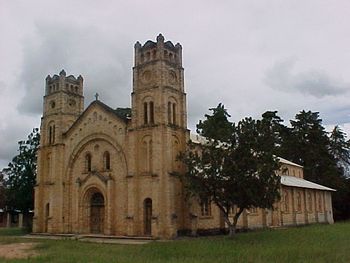Lubwa Mission: Difference between revisions
Chalochatu (talk | contribs) (Created page with "'''Lubwa Mission''', located in Chinsali District of Zambia, is a Christian mission established in the early 20th century by the United Church of Zambia. The mission is dedicated to providing education, healthcare, and spiritual guidance to the local community. One of the key components of Lubwa Mission is its education program, which includes a primary school, a secondary school, and a teacher training college. The mission also operates a vocational training c...") |
Chalochatu (talk | contribs) |
||
| (24 intermediate revisions by the same user not shown) | |||
| Line 1: | Line 1: | ||
'''Lubwa Mission''', located in [[Chinsali District]] of [[Zambia]], is a Christian mission established in the early 20th century by the United Church of Zambia. The mission | [[File:LUBWA-MISSION.jpg|350px|thumbnail|right|''Lubwa Mission in Chinsali. Source: ZNBC'']] | ||
'''Lubwa Mission''', located in [[Chinsali District]] in [[Muchinga province]] of [[Zambia]], is a Christian mission established in the early 20th century by the United Church of Zambia (Church of Scotland). The mission was dedicated to providing education, healthcare, and spiritual guidance to the local community. The provision of education was a major method of evangelisation. | |||
==History== | |||
===Education=== | |||
The mission also operated a vocational training center, which offers courses in practical skills such as carpentry, tailoring, and other trades. By 1967 Lubwa Church had been fully Africanised. It had also relinquished its role in health care and education. | |||
===Approach=== | |||
Lubwa Mission used literacy and intellectual agreement with the contents of the catechism as criteria for admission to church membership. New members were incorporated into the structure of the Mission as teachers, evangelists, catechists, or paid employees of the Mission. The converts were initially mainly young men, exhibiting a westernized style of life (use of language, food habits, clothing, house building, hygiene, child-rearing, relationship with their spouses).<ref>[https://www.semanticscholar.org/paper/The-development-of-Lubwa-Mission%2C-Chinsali%2C-Zambia%2C-Ipenburg/1c11dab1f9b7215d2e30b9ce9a3720e2dfaad0d9 The development of Lubwa Mission, Chinsali, Zambia, 1904-1967], At Ipenburg 1991</ref> | |||
===Politics=== | |||
In the 1940s Lubwa missionaries came under criticism by young mission teachers, who established a Chinsali Branch of the [[Northern Rhodesia]] [[African National Congress]] at Lubwa. The church was used as a base for the ANC to mobilise political support in [[Chinsali District]]. | |||
Lubwa Mission | Also, Lubwa Mission was very important in the area of nationalisation. Its first African minister was David Kaunda, and this was where his son [[Kenneth Kaunda]] was born and begun his career. Kaunda was later dismissed from his teaching job and moved to [[Lusaka]] to focus on his political career. | ||
==Prominent people at Lubwa== | |||
Some of the prominent people who went to Lubwa Mission include: | |||
*[[Rev. PaulMushindo]], who also helped translate the English Bible into [[Bemba language]] from 1913 to 1966 | |||
*Zambia's first republican president [[Kenneth Kaunda]] | |||
*[[Simon Kapwepwe]] | |||
*[[Robert Makasa]] | |||
*[[Alice Lenshina]], who led a break-away movement called the [[Lumpa Church]]. Lenshina drew a lot of members from Lubwa and set up her church just few kilometres from the mission. | |||
==References== | |||
<references/> | |||
[[Category:Missionaries in Zambia]] | |||
[[Category:Chinsali]] | |||
[[Category:Places in Zambia]] | |||
Latest revision as of 04:40, 16 January 2023
Lubwa Mission, located in Chinsali District in Muchinga province of Zambia, is a Christian mission established in the early 20th century by the United Church of Zambia (Church of Scotland). The mission was dedicated to providing education, healthcare, and spiritual guidance to the local community. The provision of education was a major method of evangelisation.
History
Education
The mission also operated a vocational training center, which offers courses in practical skills such as carpentry, tailoring, and other trades. By 1967 Lubwa Church had been fully Africanised. It had also relinquished its role in health care and education.
Approach
Lubwa Mission used literacy and intellectual agreement with the contents of the catechism as criteria for admission to church membership. New members were incorporated into the structure of the Mission as teachers, evangelists, catechists, or paid employees of the Mission. The converts were initially mainly young men, exhibiting a westernized style of life (use of language, food habits, clothing, house building, hygiene, child-rearing, relationship with their spouses).[1]
Politics
In the 1940s Lubwa missionaries came under criticism by young mission teachers, who established a Chinsali Branch of the Northern Rhodesia African National Congress at Lubwa. The church was used as a base for the ANC to mobilise political support in Chinsali District.
Also, Lubwa Mission was very important in the area of nationalisation. Its first African minister was David Kaunda, and this was where his son Kenneth Kaunda was born and begun his career. Kaunda was later dismissed from his teaching job and moved to Lusaka to focus on his political career.
Prominent people at Lubwa
Some of the prominent people who went to Lubwa Mission include:
- Rev. PaulMushindo, who also helped translate the English Bible into Bemba language from 1913 to 1966
- Zambia's first republican president Kenneth Kaunda
- Simon Kapwepwe
- Robert Makasa
- Alice Lenshina, who led a break-away movement called the Lumpa Church. Lenshina drew a lot of members from Lubwa and set up her church just few kilometres from the mission.
References
- ↑ The development of Lubwa Mission, Chinsali, Zambia, 1904-1967, At Ipenburg 1991
